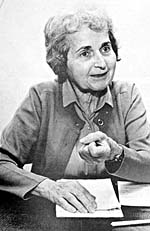Madeleine Parent, one of our greatest activists, passed away last night in Montreal after a long illness. She was 93 years old.
Madeleine was a famous union activist in Quebec, having organized the textile workers in the 1940s and then battling with the anti-union forces of the ultra-right wing Duplessis government in the 1950s. Her fierce resistance to Duplessis resulted in five arrests culminating in a conviction for seditious conspiracy in 1948 for union organizing, believe it or not. She is a legend in Quebec and was probably more influential in the Quiet Revolution than many who have gotten the credit for it. The first time I met Prime Minister Jean Chretien, he told me that Madeleine was his hero.
Madeleine then went to Ontario with her life-long partner Kent Rowley and started organizing independent Canadian unions when that was seen as a threat to the mainstream labour movement. She and Kent were mentors to a whole generation of young activists who saw independent Canadian unions as critical to creating a democratic labour movement. She was also a key player in the founding of the National Action Committee on the Status of Women where she championed the cause of Indigenous and immigrant women. I first got to know her on the executive of NAC during the 1990s where she continued to champion the rights of Indigenous, immigrant and working-class women. She was always engaged, fierce and compassionate.
One of the rare activists in this country who had equal influence in Quebec and English Canada, Madeleine always insisted on our working together. I think the best way to pay tribute to her is to quote from her own words about her role in the founding of NAC from my book Ten Thousand Roses: The Making of a Feminist Revolution. In this story, you can see the role she played as a connector between Quebec and the rest of Canada, and between young and older women.
Madeleine was one of the speakers at a cross-country meeting of women to discuss the recommendations of the 1970 Royal Commission on the Status of Women. Madeleine didn’t like the proposal to set up a government advisory committee on the status of women to implement the recommendations. She thought what was needed was an independent women’s group. Madeleine continues the story:
“A friend of mind Yvette Rousseau was heading the Quebec delegation and she told me the leaders were really pushed to accept this recommendation. That’s when I realized we were going to have a fight. Laurell Ritchie, Kay Macpherson and I went to Laura Sabia and said, ‘we have a chance to set up an independent women’s movement.’
“I opened the debate and it roared. It was filled with pros and cons right through. It was beautiful. It was the biggest, longest debate of the women’s conference. We won and it was decided that we would have our founding convention the next year.”
And Madeleine continued to be involved in NAC until its demise. She was always someone who could cut across small differences and unite people on what really matters. She was fierce, courageous and determined. Somehow I don’t think we will see the like of her again.



